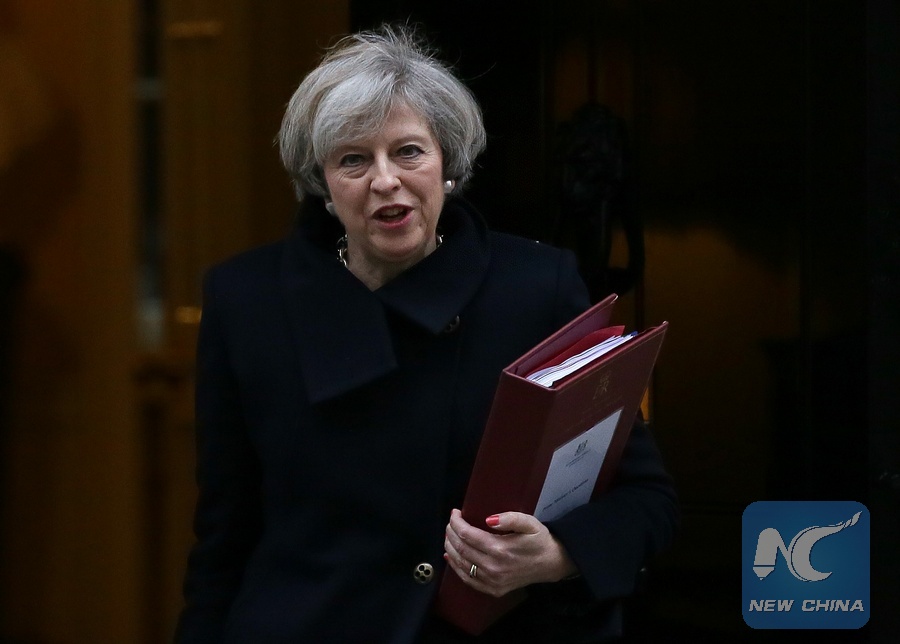British Prime Minister Theresa May leaves 10 Downing Street for Prime Minister's questions at the House of parliament in London, Britain, Feb. 8, 2017. (Xinhua/Tim Ireland)
by Peter Barker, Gui Tao
LONDON, Feb. 24 (Xinhua) -- One of the leading forces behind the successful Brexit campaign has told Xinhua he expects Britain's exit from the European Union (EU) will be a full one.
Matthew Elliott told Xinhua in a recent exclusive interview: "Brexit means leaving the single market and leaving the customs union, very much as (Prime Minister) Theresa May outlined in her recent Lancaster House speech."
"There is confusion about this. Some supporters of leave had talked about how we might stay in the single market or how we might have a deal like Norway in the European Economic Area (EEA)."
"But now there is a consensus, from the people involved in the leave side, but also from the government. It means us leaving both the EU single market and the Customs Union," he said.
Elliott was the chief executive of the Vote Leave campaign, one of the two main groups which successfully campaigned for an exit vote in the UK's EU membership referendum on June 23 last year.
The other group was the Grassroots Out campaign, which was run by the UK Independence Party (UKIP), a fringe party with just one member of parliament.
The government-appointed Electoral Commission chose Elliott's Vote Leave campaign as the official campaigning group for an EU exit because it gathered support from politicians across the main political parties, including the ruling Conservative Party and the Labour Party, which is the official opposition in Parliament.
Elliott said: "There were two strands of people on the Leave campaign; some people on the Leave campaign, particularly those associated with UKIP and Nigel Farage who tend to be more protectionist, more closed minded and tended to have a strong focus on stopping all immigration. Whereas those associated with Vote Leave...tend to have a vision of Britain as an international country open for business, free trading."
EU STABILITY
Elliott believed that the stability of the EU was an important consideration for Britain and for the other 27 nations which will constitute the EU once Britain leaves.
Britain's departure is not certain, nor is its timing. However, May has pledged to formally start the exit negotiations by the end of March by activating the Article 50 clause in Britain's EU membership.
Article 50 refers to the formal procedure by which an EU member state notifies the European Council that it intends to leave the block.
This sets the clock running, and allows two years for Britain and the EU to discuss exit arrangements. After that an exit happens, whether matters are settled or not.
 Britain's Prime Minister Theresa May delivers her keynote "Brexit speech" in Lancaster House in London, Britain on Jan. 17, 2017. (Xinhua)
Britain's Prime Minister Theresa May delivers her keynote "Brexit speech" in Lancaster House in London, Britain on Jan. 17, 2017. (Xinhua)
The House of Commons has also not opposed the government's plan to trigger Article 50.
But if Britain's departure from the EU takes place without a formal agreement or a transitional arrangement, there could be negative implications for British trade and services with the EU, and for EU services and trade with Britain.
Without an agreement of some kind, the trade arrangements would fall back on World Trade Organization (WTO) standards, which would imply higher tariffs and more paperwork on some activities, goods and services.
Elliott said: "The prime minister made it very clear she wanted the UK to be a bastion of free trade in the world and both the prime minister in her Lancaster House speech, but also Vote Leave during the campaign talked about having a bespoke EU/UK trade deal.
"Traditionally, free trade deals have been between countries that are radically different, with different regulations or tariffs between them. When you go from having free trade and the same regulations, it should be fairly straightforward to continue that."
Such a deal would be "extremely simple in goods", said Elliott, because Britain has a large trade deficit in goods with the other EU nations.
"So there is a big incentive for the other European states to make sure there is a free trade deal in goods because, of course, we are their biggest customer, their biggest single export market. So it would seem slightly illogical if they did not have a trade deal with us in goods," he said.
OPENNESS TO SERVICES
The British economy is dominated by the services sector, and the contribution it makes to exports is significant.
London, as one of the leading global financial centers, is the principal banking center for the EU.
This could aid trade in services, and is an important consideration for both Britain and the EU in Brexit negotiations.
Elliott said: "TheCityUK, the body representing the City in London, announced that they were confident the UK could get a deal for the City, and they pointed out that the City is almost the City for the whole of the EU, so it is the main capital market for the EU."
Eurozone economies and their banks "need access to the capital reserves of the City of London," he said.
An agreement which encouraged the links between the EU and the City would be beneficial for all, said Elliott.


